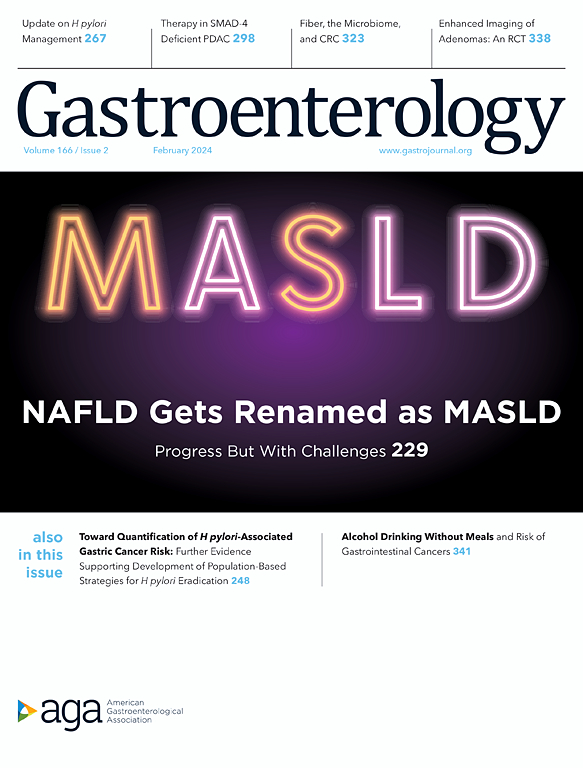Senescence, aging and disease throughout the gastrointestinal system
IF 25.7
1区 医学
Q1 GASTROENTEROLOGY & HEPATOLOGY
引用次数: 0
Abstract
Senescence is an irreversible cell cycle arrest -characterized by morphological alterations, genomic instability and secretome changes- that profoundly affects the tissue structure and function.Accumulating evidence indicates that senescence plays a relevant role in gastrointestinal pathologies: senescence contributes to salivary gland hypofunction, is instrumental in the development of oral sub-mucous fibrosis, drives age-dependent hepatic steatosis and regulates the clinical progression of steatotic liver disease. Senescence in the biliary tract develops in response to ischemic injury in biliary complications and is characteristic of biliary conditions such as biliary atresia, primary sclerosing cholangitis and primary biliary cirrhosis. Senescence also contributes to acute pancreatitis and plays a major role in the dysfunction of pancreatic beta cells. Moreover, senescence is a hallmark of a number of gastrointestinal conditions such as inflammatory bowel disease and colorectal cancer. These examples illustrate the widespread effect of cellular senescence in the gastrointestinal tract, not just as a consequence of the disease, but as a driver of pathology and a potential therapeutic target.In this review we describe the mechanisms, hallmarks and consequences of cellular senescence, as well as the therapeutic potential of senescence-targeting interventions. We aim to highlight the importance of understanding the molecular basis of senescence in gastroenterology, whilst connecting the worlds of research and clinical practice.衰老,衰老和疾病遍及胃肠道系统
衰老是一种不可逆的细胞周期停滞,以形态改变、基因组不稳定和分泌组改变为特征,深刻影响组织结构和功能。越来越多的证据表明,衰老在胃肠道疾病中起着相关作用:衰老导致唾液腺功能减退,有助于口腔粘膜下纤维化的发展,推动年龄依赖性肝脂肪变性,调节脂肪变性肝病的临床进展。胆道衰老是对胆道并发症缺血性损伤的反应,是胆道闭锁、原发性硬化性胆管炎和原发性胆汁性肝硬化等胆道疾病的特征。衰老也会导致急性胰腺炎,并在胰腺细胞功能障碍中起主要作用。此外,衰老是许多胃肠道疾病的标志,如炎症性肠病和结直肠癌。这些例子说明了胃肠道细胞衰老的广泛影响,不仅是疾病的结果,而且是病理学的驱动因素和潜在的治疗靶点。在这篇综述中,我们描述了细胞衰老的机制、特征和后果,以及衰老靶向干预的治疗潜力。我们的目标是强调理解衰老的胃肠病学分子基础的重要性,同时连接研究和临床实践的世界。
本文章由计算机程序翻译,如有差异,请以英文原文为准。
求助全文
约1分钟内获得全文
求助全文
来源期刊

Gastroenterology
医学-胃肠肝病学
CiteScore
45.60
自引率
2.40%
发文量
4366
审稿时长
26 days
期刊介绍:
Gastroenterology is the most prominent journal in the field of gastrointestinal disease. It is the flagship journal of the American Gastroenterological Association and delivers authoritative coverage of clinical, translational, and basic studies of all aspects of the digestive system, including the liver and pancreas, as well as nutrition.
Some regular features of Gastroenterology include original research studies by leading authorities, comprehensive reviews and perspectives on important topics in adult and pediatric gastroenterology and hepatology. The journal also includes features such as editorials, correspondence, and commentaries, as well as special sections like "Mentoring, Education and Training Corner," "Diversity, Equity and Inclusion in GI," "Gastro Digest," "Gastro Curbside Consult," and "Gastro Grand Rounds."
Gastroenterology also provides digital media materials such as videos and "GI Rapid Reel" animations. It is abstracted and indexed in various databases including Scopus, Biological Abstracts, Current Contents, Embase, Nutrition Abstracts, Chemical Abstracts, Current Awareness in Biological Sciences, PubMed/Medline, and the Science Citation Index.
 求助内容:
求助内容: 应助结果提醒方式:
应助结果提醒方式:


